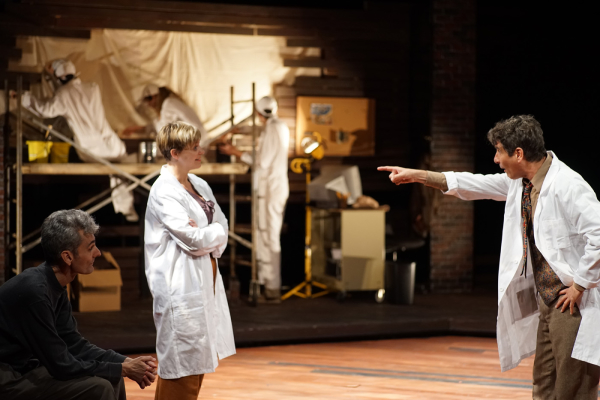The Iron Curtain Trilogy (Cockpit Theatre)
David Edgar’s plays centring on the Eastern Bloc are given an urgent revival by American company Burning Coal

© Jason Dail
David Edgar didn't write his three big political plays of the 1990s as a trilogy, but they are being presented as such, and with interest, under the generic title of The Iron Curtain Trilogy by the plucky Burning Coal company of North Carolina at the Cockpit this month.
While David Hare's mid-1990s trilogy homed in on the Church, the Law and the Labour Party, Edgar was cocking his ear, and his sights, on what was happening in Prague, Sarajevo and the Middle East: the language of international politics, the forging of new nations and democracies.
This is a guide, at once phlegmatic and nostalgic, to what has happened since the Wall came down, with particular regard to the linguistics of negotiation, the insurgencies and "new politics" of international diplomacy, with all those summit conferences, meetings and face-offs on sacred ground and neutral territory.
In the first play, The Shape of the Table, we stayed more or less in Prague for the Velvet Revolution. But in the two later plays, both originally commissioned and performed by the Royal Shakespeare Company, in small-scale productions by Michael Attenborough, we move to the Balkans – Pentecost, the best of the three dramas, posits a multi-layered scenario on the discovery of a Giotto fresco in an abandoned church – and, in The Prisoner's Dilemma, to a former Soviet republic where there's a breakaway independent movement and trouble with hostages and medical aid personnel.
The extraordinary thing about these plays is that they haven't dated; the time lag reinforces the skill and agility of Edgar's writing as well as its general application. The first act of Pentecost moves from the appropriation of art (Elgin marbles, anyone?) to the reclaiming of a country, and is as metaphorically engaging, and indeed moving, as Stoppard's Arcadia, or Bennett's People.
The play is also crammed with good jokes, some "in quotes," some not, and moves into another gear altogether when a bunch of asylum seekers rush into the church. The idea of desecration – what a place Sarajevo was, or indeed Beirut – is given a potent poignancy; terrible events, and useful social functions, have occurred in holy places.
Hope Hynes Love is notably impassioned as the art historian in this play, just as Jeanine Frost scores a beautifully dressed bulls-eye as a Finnish negotiator travelling between California, Geneva and the Mediterranean in The Prisoner's Dilemma; the great irruption in this piece is the ambush of a UN-style convoy of medical supplies by armed separatists.
This leads to an anguished scene in which Julie Oliver's aid worker is forced at gunpoint to choose between shooting a child or a colleague. She's a teacher from London who, two years after this incident, is running a classroom in the new independent province with a glowering military presence in the corner; the argument's only just starting.
The big issue in all three plays: is the future of these countries more to do with self-determination, or what the West thinks is the best outcome? There's no avoiding this topic today, which is why the Edgar trilogy still seems so urgent. The next step, surely, is a full-scale re-staging at one of our own leading regional or national companies.












